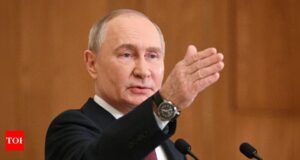Israel accused of crimes against humanity over forced displacement in Gaza
Peter Beaumont
Israel is using evacuation orders to pursue the “deliberate and massive forced displacement” of Palestinian civilians in Gaza, according to a report by Human Rights Watch, which says the policy amounts to crimes against humanity.
The US-based group added it had collected evidence that suggested “the war crime of forcible transfer [of the civilian population]”, describing it as “a grave breach of the Geneva conventions and a crime under the Rome statute of the international criminal court”.
The report was published amid mounting evidence that Israel is accelerating its efforts to cut the Gaza Strip in two with a buffer zone and is building new infrastructure to support a prolonged military presence, with an increased pace of demolitions and destruction.
Residents in northern Gaza said Israeli forces were besieging displaced families and the remaining population, which some estimated at a few thousand, ordering them to head south through a checkpoint separating two towns and a refugee camp from Gaza City.
Men were held for questioning, while women and children were allowed to continue towards Gaza City, residents and Palestinian medics said.
Calling for Israel’s policy of forced displacement to be investigated by the international criminal court, Human Rights Watch also urged targeted sanctions against Israel including the cessation of arms sales.
Read more here: Israel accused of crimes against humanity over forced displacement in Gaza
Key events
Here are some of the latest images sent to us over the newswires from the region.
with head of the Iranian atomic organisation Mohammad Eslami (R). Photograph: Abedin Taherkenareh/EPA
In the UK, Hamish Falconer, who is the under-secretary of state for the Middle East in the Labour government, has added his voice to condemnation of comments by Israeli finance minister Bezalel Smotrich concerning Israeli plans to fully and permanently annexe the West Bank, which it has occupied since 1967.
Smotrich, after the election of Donald Trump in the US, declared 2025 to be a “year of sovereignty” for the occupied West Bank, which he habitually calls Judea and Samaria.
Falconer said “I condemn minister Smotrich’s comments proposing annexation of land in the West Bank. Annexation only undermines the prospects for peace, would lead to greater instability and would be illegal under international law. The Israeli government must reject this.”
Smotrich, who has made similar assertions over the years and has described it as his life’s mission to thwart the creation of a Palestinian state, has faced no sanction from prime minister Benjamin Netanyahu for the comments.
Palestinian news agency Wafa reports that in Jalud village, south of Nablus, Israeli settlers have attacked and stolen some of the olive crop. Wafa notes there have been more than 250 attacks of this nature since the beginning of the 2024 olive harvest season. It reports that in today’s incident the settlers fired on Palestinians, and were, it says, “under the protection of the occupation forces.”
Al Jazeera reports that two more people have been killed by Israeli strikes on Gaza. The news network reports that “the attack, in Beit Lahiya, which hit a house, also wounded several people.”
Benjamin Netanyahu’s government has banned Al Jazeera from operating inside Israel and the Israeli-occupied West Bank.
In the wake of a new report by Human Rights Watch which accuses Israel of crimes against humanity over its policy of forcing the displacement of people in Gaza, people working for ActionAid Palestine have been talking of their experiences of being forcibly moved around the Gaza Strip by Israel’s military action.
Asmaa, 40, works for an organisation helping women and girls in the territory, and says:
The war has numerous negative effects on women’s lives. I lost the safety I used to feel. I lost everything imaginable, from my house to my safety, privacy, and dignity. The war took away the house we spent so much time building. Our memories, hopes, and aspirations. These were all stolen from us.
Fatma, a project officer with ActionAid, has been displaced multiple times herself, saying:
[My family and I] have been trapped in a constant cycle of displacement and loss. We have been forced to flee again and again, moving from the north to the south, seeking and searching for safety, survival and security. The devastation we have endured, seeing the same heartbreak in other families, has been overwhelming.
IAEA’s Grossi: concrete results needed over Iran nuclear programme to avoid ‘conflict and ultimately war’
The UN’s atomic energy chief has said it is important to make progress with Iran in order to aovid the possibility of war.
Rafael Grossi, director general of the International Atomic Energy Agency, was speaking in Tehran at a press conference, after a visit aimed at improving the inspection regime for Iran’s nuclear facilities.
AFP quotes him saying:
It is indispensable to get, at this point in time, to some concrete, tangible, visible results that will indicate that this joint work is improving the situation … and in a general sense is moving us away from conflict and ultimately war.
Earlier, Iran’s foreign minister Abbas Araqchi said the country was not prepared to negotiate while it was “under pressure and intimidation.”
Iran has been accused by the west of using its nuclear programme in an attempt to make weapons. Iran has argued it is a peaceful civilian energy programme.
The head of Iran’s programme, Mohammad Eslami, speaking alongside Grossi, also issued a warning, saying:
Any interventionist resolution in the nuclear affairs of the Islamic Republic of Iran will definitely be met with immediate countermeasures.
Israel’s Arabic-language mnilitary spokesperson has again issued orders for residents to evacuate specific locations in southern Beirut ahead of an imminent Israeli attack.
Israel claims to be targeting Hezbollah facilities. The city has already been struck several times today.
Lebanon’s National News Agency reports that Israel has struck twice at Deir el Zahrani in the south of the country, after munitions failed to explode in the initial attack. The NNA published a picture of an Israeli weapon lying unexploded in the road.
Palestinian media sources are reporting that Hezbollah has claimed to have attacked Israeli troops inside the south-east of Lebanon between Houla and Markaba with a volley of rockets. The claims have not been independently verified.
Several blocks of flats have been destroyed by Israeli strikes in Bint Jbeil in southern Lebanon, AFP reports, citing Lebanese media. The town is close to the UN-drawn blue line that separates Israel and Lebanon. Israel says it has been targeting Hezbollah facilities in the area.
Iran foreign minister: Tehren will not enter nuclear negotiations ‘under pressure and intimidation’
Iran’s foreign minister, Abbas Araqchi, has posted a readout to social media after meeting with the head of the UN’s nuclear agency, the IAEA.
In the messages, Araqchi said he and Rafael Grossi had “important and straightforward talks” but stressed that Tehran was not willing to entertain negotiations “under pressure and intimidation.”
As a committed member of NPT [the treaty on the non-proliferation of nuclear weapons] we continue our full cooperation with the IAEA.
Differences can be resolved through cooperation and dialogue.
We agreed to proceed with courage and good will.
Iran has never left the negotiation table on its peaceful nuclear programme. The ball is in the EU/E3 court.
Willing to negotiate based on our national interest and our inalienable rights, but NOT ready to negotiate under pressure and intimidation.
The last part could be read as a warning to incoming US president Donald Trump, who unilaterally pulled the US out of the Iran nuclear agreement and reimposed sanctions.
Iran has always maintained its nuclear programme is an entirely peaceful civilian one, an assertion that has been doubted by some western observers, in particular the US and Israel, who have accused Tehran of seeking nuclear weapons. Israel has never officially declared it has a nuclear weapons capability, but is widely believed to do so.
Israel’s military has reported warning sirens sounding again in northern Israel.




